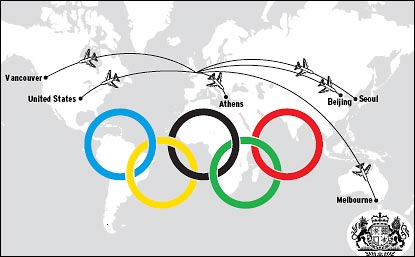A recent article in the Telegraph makes light of the fact that Olympics is very far from home indeed: it seems the initial excitement about London 2010 is already raising inland eyebrows. Recent questionably high numbers of taxpayer-funded junkets have been made by political committee members in the name of investigating and learning from former Olympic host cities. In light of this globe-trotting, it may be obvious to note the displaced understandings here of what it means for the Olympics to ‘bring the world together’. Togetherness in this case in not local, and what we think of as global seems to come together in these instances under the arenas of national competition, representation and one-upmanship. Not to dismiss the value brought to the athletes via their experiences (and those of their entourages, the officials and the press), the localities produced by the Games seem far removed from the reality of its host city, and it is rather the case that the local must be sold to its own people in terms of consumables, media and economic boosts via jobs, tourism and other short term et ceteras. In the cases of British research junkets and the year-long torch relay for the Beijing 2008 Olympics, it looks a lot more like post-colonialism in the name of cosmopolitanism (and in the above image, the ‘logo’ of the Queen!). The Empire of Sportsmanship is brought back to the local (like the glorious cat’s dead prey dropped inside the kitchen) whether we like it or not, beginning from the moment that the host city ‘winner’ is announced to however long a particular Olympics morning-after period may last. What is more interesting, then, is to examine how the cosmopolitanism of the Olympics does filter back to local practices, not in terms of illusory togetherness but, hopefully, by means of more sustainable exchanges and sharing in the sense of Jean-Luc Nancy’s inoperative community. Here we can examine the communities that are created not as fixed entities or operations (e.g., Olympics-type cosmopolitanism), but rather look toward dynamics affecting the local long after the ceremonies have closed and ‘cosmopolitan’ has left.
I still remember being quite shocked and moved by the level of excitement and emotion in the faces of all the flag-waving Chinese celebrating in Tiananmen square upon the announcement of Beijing’s bid for the 2008 Olympics. Watching on television from Hong Kong as those interviewed were moved even to tears, even my grandmother took interest and said, “Now at least China won’t bother Taiwan too much for a while longer.”
Seven years later, a friend sits with me at a café on Guloudong Dajie telling me how a crowd gathered one night outside a small shop near his home because the owner refused to move out by the marked date for the shop’s demolition. Its worn facade has in 2008 unfortunately become an unsightly too close to the Forbidden City—-thereby highly visible to the incoming flux of visitors who will likely pass by on their way to visit the palaces. The crowd of those gathered to see a potential forced removal were restless, and complaints over the Olympics roared loadly, with unmentionables like six-four even dared to be recalled in public space. On the other hand, not so far from that hutong my own neighbour has hung a miniature Chinese flag from his car antenna, and when asked by a friend why he has all of a sudden initiated this little act of patriotism, he replies matter-of-factly, “The Olympics will be here soon. Who doesn’t love the country?” (“奥运快到了,谁都不爱国?”)
All of these are ongoing processes within this flux of global-local, and just some of the many layers that we have to examine in order to understand a burgeoning Chinese economy, culture and society and how it finds itself in relation to a larger view. Of course, this is an oversimplification, but we can only begin to understand community when we examine in context its processes and the dynamics underscoring its identity. While the stadium may be left empty after the party (as has been the case with Athens after 2004), there has been in Beijing, for example, amazing amounts of newly-built infrastructure of which the city has long been in need. And what about the loosening up of the press, the acculturation of Beijingers to new tenets of civil society like queueing in line and reducing the usage of plastic bags? Will these things last as long as the fad for “I HEART China” t-shirts? I keep thinking of the over 2 billion trees that have been planted all over Beijing (Xinhua). Let’s hope.


 时间 posted on: 20 July 2008 |
时间 posted on: 20 July 2008 |  发布者 author:
发布者 author: 
 分类 filed under:
分类 filed under: